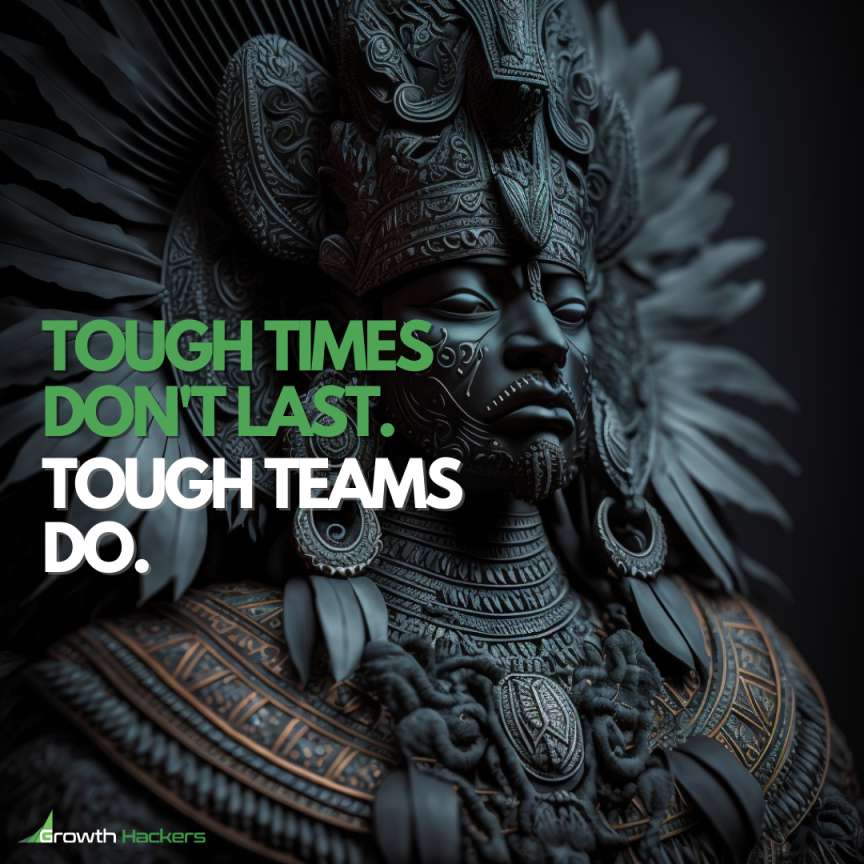Marketing teams today need to be more dynamic and adaptive than ever before. With the rise of digital media, new marketing channels are constantly emerging, with marketing automation taking the digital business by storm. Businesses need to be able to quickly identify which ones are right for them and how to effectively use them.
This can be a challenge, but by structuring your team in the right way, you can set yourself up for success.
However, it’s easier said than done. The first challenge before you create a structure for your dream marketing team is to decide whether to go in-house or vote for outsourcing. There are benefits and drawbacks to each marketing approach as well as basic requirements like resources to consider when structuring your team.
And whichever approach you choose, you need to ensure it gives you the maximum output for all your marketing efforts. In this article, we delve into the method and details of what it takes to build an effective digital marketing team structure to arrive at a great digital marketing team.
What are the Key Components of Top-Class Digital Marketing Teams?
There are a few key components that are essential for any successful digital marketing team. First and foremost, you need a solid marketing strategy. This should be based on extensive market research and should take into account your objectives and budget.
Once you have a clear strategy in place, you can then start to assemble your team. The perfect digital marketing team will have a mix of skills and experience, with each team member bringing something unique to the table. You’ll need designers, copywriters, developers, and analysts, all working together to create an effective campaign.
And of course, no digital marketing team would be complete without a strong leader to keep everyone on track and motivated. In this case, a competent and responsible digital marketing manager. With these key components in place, you’re well on your way to success.
Breaking down the ideal marketing team structure
Marketing teams come in all shapes and sizes. There is no one-size-fits-all solution when it comes to team structure. The ideal marketing team structure depends on the size and scope of the organization, the products or services being marketed, and the needs of the target customer.
Businesses come in all sizes, small, medium, and big, with varying resources and growth needs. The first step to ensure before you get started on building a team structure is to identify what size your company or business fits into.
Next, you should consider the various existing team structures available and decide which best suits your business model. Here are three of the best and most efficient marketing team structures, with their pros and cons, to consider.
The Centralized Approach
In a centralized marketing structure, all aspects of marketing are overseen and managed by a small, central team. This team is responsible for developing the marketing strategy, overseeing the execution of marketing campaigns, monitoring the various digital marketing channels, and managing the day-to-day operations of the marketing department.
The centralized approach can be beneficial for organizations that want to maintain tight control over their marketing efforts. With all decisions being made by a central team, there is less risk of campaigns being executed incorrectly or failing to align with the organization’s overall goals.
Additionally, this structure can allow for greater efficiency and coordination between different marketing initiatives. However, the centralized approach can also be inflexible and may not be well-suited for organizations that operate in rapidly changing markets.
Moreover, it can be difficult to scale a centralized marketing team as an organization grows. For these reasons, it is important to carefully consider whether a centralized structure is right for your organization before making any decisions.
The Divisional Approach
In a centralized marketing structure, all aspects of marketing are overseen and managed by a small, central team. This team is responsible for developing the marketing strategy, overseeing the execution of marketing campaigns, and managing the day-to-day operations of the digital building of team structured marketing department.
The centralized approach can be beneficial for organizations that want to maintain tight control over their marketing efforts. With all decisions being made by a central team, there is less risk of campaigns being executed incorrectly or failing to align with the organization’s overall goals.
Additionally, this structure can allow for greater efficiency and coordination between different marketing initiatives. However, the centralized approach can also be inflexible and may not be well-suited for organizations that operate in rapidly changing markets.
Moreover, it can be difficult to scale a centralized marketing team as an organization grows. For these reasons, it is important to carefully consider whether a centralized structure is right for your organization before making any decisions.
The Hub & Spoke Approach
The Hub & Spoke Approach is a popular marketing team structure that can be used to build an effective and efficient team. This approach involves creating a central “hub” of marketing activity, with each “spoke” representing a different marketing channel.
For example, the hub may be responsible for creating and distributing content, while the spokes could be responsible for social media, email marketing, and paid advertising. By using this approach, businesses can ensure that all of their marketing efforts are coordinated and that each channel is being used to its full potential.
Additionally, this approach can help to reduce duplication of effort and ensure that each channel is working towards the same goals. Ultimately, the Hub & Spoke Approach can be an excellent way to build a high-performing marketing team.
How to Build an Effective Digital Marketing Team Structure
In order to build an effective and dedicated digital marketing team, it is important to consider the various roles that need to be filled and how they will interact with each other. A good team structure will take into account the different skills and knowledge required for each role, as well as the necessary levels of communication and collaboration.
That said, here is an ideal plan for how your marketing team can be structured. Do keep in mind that there are variously specific digital marketing team structures and what might work for your business needs might not necessarily work for another company.
1. Marketing Director
The marketing leadership is typically headed by the director of marketing, who is responsible for developing and overseeing the implementation of the digital marketing strategy.
In larger companies, the digital marketing department may also include a VP (Vice President) of marketing, who is responsible for day-to-day operations, and a chief marketing officer (CMO), who is responsible for overall strategic direction.
Marketing leadership is responsible for ensuring that the marketing team has the necessary resources to carry out its objectives and that all initiatives are aligned with the company’s overall business strategy. Even the decision of outsourcing digital marketing lies in the hands of the marketing director.
Under the Marketing Leadership are the Editorial and Acquisitions Directors.
Are you looking to build an effective digital marketing team structure?
Contact Growth Hackers
2. Editorial Director
An editorial director is generally responsible for supervising the content generation of a company’s publications. This includes print and digital content, as well as both textual and graphical elements.
The director is also typically responsible for the company’s digital face, overseeing social media accounts and website content. In many cases, he or she will also be involved in the marketing of the company’s products and services. This may include developing marketing plans, overseeing advertising campaigns, and working with sales teams.
Under the leadership of the Editorial Director are the Content and Creative Managers.
2.1 Content Manager
The primary responsibility of a content manager is to develop and oversee a content marketing strategy that will meet the needs of the marketing team and the company as a whole. This includes identifying the target audience, determining what type of content will be most effective, and setting deadlines for content creation.
In addition, the content manager also works closely with the other members of the marketing team to ensure that all of the content fits together to create a cohesive message. Without a content manager, it would be very difficult for a marketing team to implement integrated marketing strategies and create successful and effective marketing campaigns.
A Content Manager oversees various marketing sub-teams like blog writers, SMMs, and media editors.
Blog Writers
A blog writer is a key member of any marketing team. By creating compelling and well-written content, they can help to attract readers and drive traffic to a company’s website. In addition, they can help to promote a company’s products or services, build brand awareness, and generate leads through online marketing.
Social Media Managers
A social media manager is responsible for creating and maintaining a company’s social media presence. Social media marketing efforts include developing content, managing campaigns, and engaging with customers and followers.
A good social media manager understands the unique dynamics of each platform and how to use them to achieve desired results. They also have a keen eye for what kind of content will resonate with their audience and how to effectively target potential customers.
Media Editors
As the voice of the company, they are responsible for creating and curating great content that will drive traffic and conversions. They are also responsible for ensuring that the company’s message is clear and consistent across all channels.
In addition to creativity, media editors must also have strong analytical skills to measure the effectiveness of their campaigns and adjust their strategies accordingly.
2.2 Creative Manager
A Creative Manager is responsible for planning, creating, and executing marketing and advertising campaigns that promote a company’s products or services. In many cases, he or she will work closely with the Marketing Manager to develop campaigns that target specific demographics and markets.
The Creative Manager may also be responsible for supervising a team of graphic designers, copywriters, and other creative professionals. Ultimately, the goal is to develop effective marketing materials that capture the attention of potential customers and drive sales.
A Creative Manager has several specialists working under him or her such as the graphic designer, brand strategist, and front-end developers.
Graphic Designer
Depending on the particular company’s structure, the role of a graphic designer within the marketing team can vary greatly. However, most commonly they will be responsible for creating visuals that communicate messages or ideas, usually with a focus on promoting or selling a product or service.
This could include designing ads, packaging, illustrations, logos, and layout for print publications like magazines or newspapers. Graphic designers use their creativity and artistic skillset to solve problems and create visually appealing and effective designs that convey messages clearly to their intended audience.
Front-end Developer
A front-end developer is someone who takes charge of the visual and interactive aspects of a website or application. It’s their job to make sure that the user experience is seamless, intuitive, and engaging. In order to do this, they need to have a deep understanding of both design and coding.
Brand Strategist
The brand strategist’s role is to develop and implement strategies that will help the company achieve its marketing goals. This may involve conducting research, developing creative concepts, and working with other members of the marketing team to ensure that the campaign is executed effectively.
In many cases, the brand strategist will also have a hand in measuring the results of the campaign to ensure that it was successful in achieving its objectives.
3. Acquisitions Director
The role of an Acquisitions Director is to develop and implement strategies to acquire new customers and grow the customer base. An Acquisitions Director may be responsible for a wide range of marketing activities, from developing targeted marketing campaigns to overseeing market research.
In many cases, the Acquisitions Director will also be responsible for managing a team of marketing professionals. As such, the Acquisitions Director must have strong leadership skills and a deep understanding of marketing principles.
The Acquisitions Director is supervised by the Marketing Director and has various managers like the Analytics and Lead Gen Manager under his or her supervision.
3.1 Analytics Manager
The Analytics Manager is responsible for overseeing the collection and analysis of data related to marketing campaigns and initiatives. They work closely with other members of the marketing team to identify key areas of focus and ensure that data is collected and analyzed in a way that provides actionable insights.
In addition, the Analytics Manager also works with other departments within the organization (such as Finance and IT) to ensure that data is being used effectively across the board. Under the supervision of the Analytics Manager come the data analysts, conversion rate optimization specialists, and A/B testing specialists.
Data Analyst
A Data Analyst is responsible for reviewing and analyzing data that is relevant to the marketing team. This data can include customer information, sales figures, and web traffic.
The goal of a Data Analyst is to identify trends and patterns that can be used to improve marketing strategies. For example, a Data Analyst might examine customer data to identify patterns in purchasing behavior. This information can then be used to develop targeted marketing campaigns.
Beat the competition by building an effective digital marketing team structure today!
Conversion Rate Optimization Specialist
The specialist’s primary responsibility is to increase the number of website visitors who take the desired action, such as making a purchase or signing up for a newsletter. To do this, they use a variety of techniques, including A/B testing, user testing, and data analysis.
They also work closely with other members of the marketing team, such as content writers and web designers, to ensure that the website is optimized for conversion.
A/B Testing Specialist
Their role is to design and implement split tests that help to improve the performance of marketing campaigns. A/B Testing Specialists are responsible for developing hypotheses about what might improve the campaign’s success, and then designing and executing tests to see if those hypotheses are correct. They also analyze the results of the tests and make recommendations about how to improve future campaigns.
3.2 Lead Generation Manager
The Lead Generation Manager is responsible for generating leads through various marketing channels and also manages the nurturing process of those leads until they are ready to be passed on to sales.
The Lead Generation Manager must have a strategic vision and be able to execute that vision through the use of various marketing channels such as content marketing, SEO, email marketing, and social media. They must also be able to work closely with the sales team to ensure that leads are being followed up on in a timely manner and are being converted into customers.
Under the Lead Gen Manager come specialists like SEO specialists, Email specialists, and Paid media specialists.
SEO Specialist
A Search Engine Optimization Specialist is responsible for optimizing a company’s website for search engine visibility. This includes on-page optimization, such as title tags, meta descriptions, and keyword research, as well as off-page optimization, such as link building and content marketing.
Email Specialist
The Email Specialist is responsible for the creation and execution of email marketing campaigns. They work closely with the marketing team to develop strategies that will increase email open rates and click-through rates. In addition, they are responsible for segmenting lists, managing budgets, and ensuring that all digital marketing campaigns are compliant with anti-spam laws.
- Paid Media Specialist
Paid media specialists work with a team of analysts and creatives to develop strategies that will reach the target audience and achieve the desired results. Paid media specialists are responsible for all aspects of a digital marketing campaign, from research to planning to execution. They must have a deep understanding of how online advertising works in order to create effective campaigns.
Final Thoughts on How to Build an Effective Digital Marketing Team Structure
Now that we’ve gone over the basics of how to build an effective digital marketing team structure, let’s take a look at some final thoughts. First, it’s important to remember that there is no one “right” way to do things – every company and team is different, and what works for one may not work for another.
Second, it’s also important to be flexible and willing to adjust your team structure as your business grows and changes.
Finally, don’t forget that your team is only as strong as its weakest member – so make sure you invest in training and development and give your team members the resources they need to be successful. Note that working with a digital marketing coach can speed up your processes. By following these tips, you should be well on your way to putting together a high-performing digital marketing team.
At Growth Hackers, we specialize in helping businesses with effective digital marketing services. We understand the importance of having a team that is aligned with your business goals and that has the skills and knowledge necessary to succeed in the ever-changing digital landscape.
We will work with you to assess your specific needs and then create a customized team structure that will allow your business to thrive. Our team of experts has a proven track record of success in helping businesses reach their full potential online.
Contact Growth Hackers today to learn more about how we can help you build an effective digital marketing team.












1 Comment
Great post! Your insights into digital marketing strategies, especially regarding advertising services, are spot on. Your practical advice makes it easier for businesses to navigate the complexities of online advertising. Keep up the excellent work!